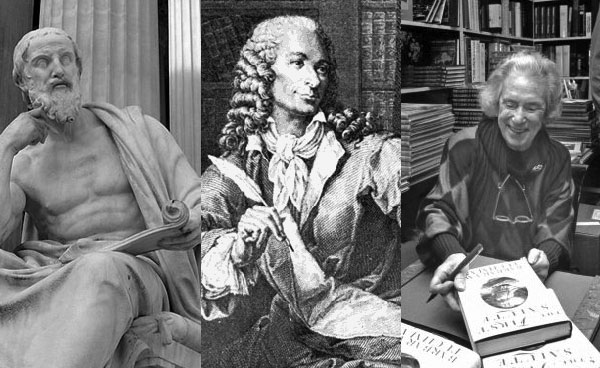Writers write for audiences which are presumably well defined in their minds. Their manuscripts are narratives addressed to their imaginary circle of friends and admirers who they entertain and cajole by the twists and turns of their extended tales.
Historians, on the other hand, have three audiences, and they address their comments to each in turn.

First, each historian speaks to his predecessors, corrects them where deemed necessary because of their inadvertent exclusions or misinterpretations. If exclusions were “inexcusable” because the data was readily available to them with a little additional effort, it is likely that the culprit will receive a shellacking and be condemned. More often, however, exclusions are due to the stark fact that new data appeared and filled in details previously missing, rather than force continuity upon earlier writers who had relied on their historical imagination, who substituted conjecture for missing data.
The second audience of a historian are his/her contemporaries, many of whom are assumed to be already familiar with the episodes to be discussed or the main characters of the narratives. Often it happens that the themes discussed are “modish”, are driven by contemporary problems. What roles did “spies” play in earlier periods? Did they exist at all and what credence was placed on their testimonies? Recently there has been a spate of books and television programmes on Henry VIII and his chequered times, yet few readers or viewers will be familiar with the life and times of many of its “minor” characters, including its spies, who nevertheless contributed to the “story-line”. Christopher Marlow, Antony Bacon or Sir Francis Walsingham were all actors engaged in spying, but the first two had minor parts whereas Walsingham was prominent as a defender of Protestantism and of English/Scottish independence from European hegemony, and had his “men” placed in several capitals of Europe.
The third audience a historian has in mind when writing is less palpable: unborn generations of readers who view their received legacy through the eyes of past writers of note. The historian see himself/herself as someone who may influence the future by providing an interpretation and a record of this past. Their influence may be minor or, on the model of Gibbons amongst others, be writers of considerable significance. It may be short-term effect — as in the case of H.G. Wells — or long-term, as Julius Caesar or Cicero have been. Generations of British leaders were schooled in both these classical authors during their school-days and as university students.
I am sure some writers do not recognize themselves as aspiring to such lofty heights but view themselves as journeymen, not prophets. All honour to such writers and purveyors of “truths”. Let us agree, furthermore, that historians are ill-advised to see themselves as politicians, as influencing by their writings or teaching the distant future, except indirectly. For the truth is that historians are ill suited to that task and — generally speaking — they are more honourable in their intent than most politicians. The interpretation of the past may influence our future actions as individuals or as communities, but how this plays out remains a puzzle and is best left to future historians to discern for each historical period.
